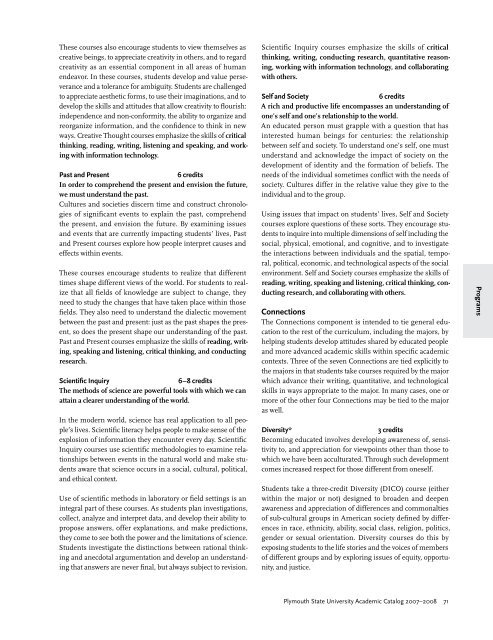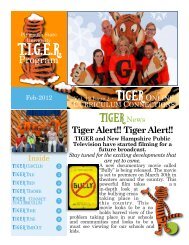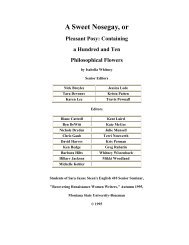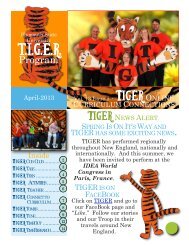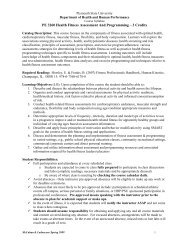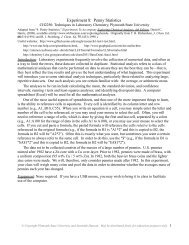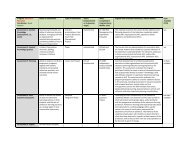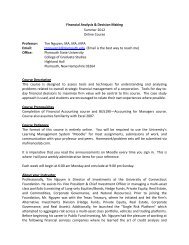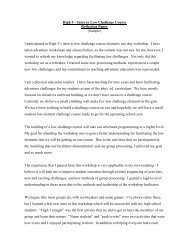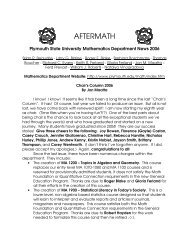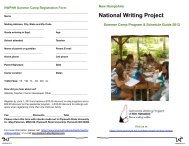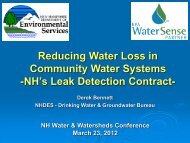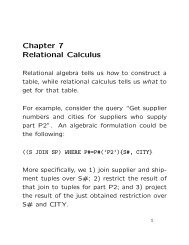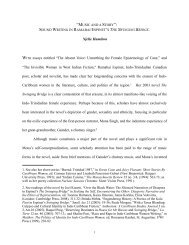2007-2008 Undergraduate Academic Catalog - Plymouth State ...
2007-2008 Undergraduate Academic Catalog - Plymouth State ...
2007-2008 Undergraduate Academic Catalog - Plymouth State ...
- No tags were found...
Create successful ePaper yourself
Turn your PDF publications into a flip-book with our unique Google optimized e-Paper software.
These courses also encourage students to view themselves ascreative beings, to appreciate creativity in others, and to regardcreativity as an essential component in all areas of humanendeavor. In these courses, students develop and value perseveranceand a tolerance for ambiguity. Students are challengedto appreciate aesthetic forms, to use their imaginations, and todevelop the skills and attitudes that allow creativity to flourish:independence and non-conformity, the ability to organize andreorganize information, and the confidence to think in newways. Creative Thought courses emphasize the skills of criticalthinking, reading, writing, listening and speaking, and workingwith information technology.Past and Present6 creditsIn order to comprehend the present and envision the future,we must understand the past.Cultures and societies discern time and construct chronologiesof significant events to explain the past, comprehendthe present, and envision the future. By examining issuesand events that are currently impacting students’ lives, Pastand Present courses explore how people interpret causes andeffects within events.These courses encourage students to realize that differenttimes shape different views of the world. For students to realizethat all fields of knowledge are subject to change, theyneed to study the changes that have taken place within thosefields. They also need to understand the dialectic movementbetween the past and present: just as the past shapes the present,so does the present shape our understanding of the past.Past and Present courses emphasize the skills of reading, writing,speaking and listening, critical thinking, and conductingresearch.Scientific Inquiry6–8 creditsThe methods of science are powerful tools with which we canattain a clearer understanding of the world.In the modern world, science has real application to all people’slives. Scientific literacy helps people to make sense of theexplosion of information they encounter every day. ScientificInquiry courses use scientific methodologies to examine relationshipsbetween events in the natural world and make studentsaware that science occurs in a social, cultural, political,and ethical context.Use of scientific methods in laboratory or field settings is anintegral part of these courses. As students plan investigations,collect, analyze and interpret data, and develop their ability topropose answers, offer explanations, and make predictions,they come to see both the power and the limitations of science.Students investigate the distinctions between rational thinkingand anecdotal argumentation and develop an understandingthat answers are never final, but always subject to revision.Scientific Inquiry courses emphasize the skills of criticalthinking, writing, conducting research, quantitative reasoning,working with information technology, and collaboratingwith others.Self and Society6 creditsA rich and productive life encompasses an understanding ofone’s self and one’s relationship to the world.An educated person must grapple with a question that hasinterested human beings for centuries: the relationshipbetween self and society. To understand one’s self, one mustunderstand and acknowledge the impact of society on thedevelopment of identity and the formation of beliefs. Theneeds of the individual sometimes conflict with the needs ofsociety. Cultures differ in the relative value they give to theindividual and to the group.Using issues that impact on students’ lives, Self and Societycourses explore questions of these sorts. They encourage studentsto inquire into multiple dimensions of self including thesocial, physical, emotional, and cognitive, and to investigatethe interactions between individuals and the spatial, temporal,political, economic, and technological aspects of the socialenvironment. Self and Society courses emphasize the skills ofreading, writing, speaking and listening, critical thinking, conductingresearch, and collaborating with others.ConnectionsThe Connections component is intended to tie general educationto the rest of the curriculum, including the majors, byhelping students develop attitudes shared by educated peopleand more advanced academic skills within specific academiccontexts. Three of the seven Connections are tied explicitly tothe majors in that students take courses required by the majorwhich advance their writing, quantitative, and technologicalskills in ways appropriate to the major. In many cases, one ormore of the other four Connections may be tied to the majoras well.Diversity*3 creditsBecoming educated involves developing awareness of, sensitivityto, and appreciation for viewpoints other than those towhich we have been acculturated. Through such developmentcomes increased respect for those different from oneself.Students take a three-credit Diversity (DICO) course (eitherwithin the major or not) designed to broaden and deepenawareness and appreciation of differences and commonaltiesof sub-cultural groups in American society defined by differencesin race, ethnicity, ability, social class, religion, politics,gender or sexual orientation. Diversity courses do this byexposing students to the life stories and the voices of membersof different groups and by exploring issues of equity, opportunity,and justice.Programs<strong>Plymouth</strong> <strong>State</strong> University <strong>Academic</strong> <strong>Catalog</strong> <strong>2007</strong>–<strong>2008</strong> 71


